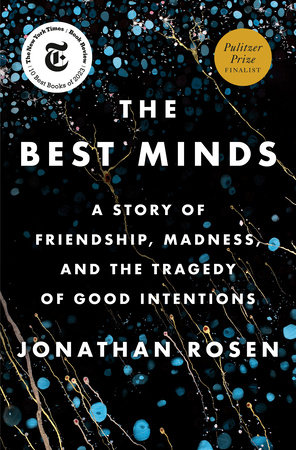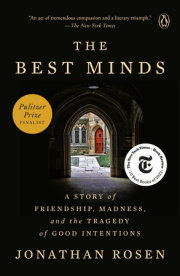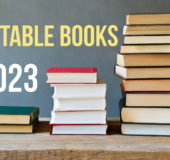Chapter One
The Suitable Playmate
When you were a small boy, the aim of the suitable playmate could not have been more perfectly fulfilled: across the street was Michael Laudor, the ideal friend. A
brilliant peer.
-Cynthia Ozick, letter to the author
My family moved to New Rochelle in 1973. There were good schools, green lawns, and quaint signs painted in the 1920s bearing legends like only forty-five minutes from broadway and city of homes, churches and schools, though there were four synagogues and Metro North got you to Manhattan-the rock around which all life revolved-in thirty-three minutes. But the real reason we moved to New Rochelle was so that I could meet Michael.
That, at least, is what my mother's best friend, the writer Cynthia Ozick, told me:
I heard much of Michael Laudor when you were growing up. And in a way even before you knew of his existence, in this sense: that Michael, or someone like him, was always the goal in choosing where to buy a house.
Michael, in other words, was inevitable. I was destined to meet him, or at least someone like him, because friendship cannot actually be foretold any more than madness or the day of your death. Can it?
I met Michael soon after we moved in, as I was examining a heap of junk that the previous owners had left in a neat pile at the edge of our lawn. I was looking for relics of the three athletic boys who had lived there, and wondering if a small aquarium was worth salvaging, when a boy with shaggy red-brown hair and large tinted aviator glasses walked over to welcome me to the neighborhood.
He was taller even than I was, gawky but with a lilting stride that was oddly purposeful for a kid our age, as if he actually had someplace to go. His habit of launching himself up and forward with every step, gathering height in order to achieve distance, was so distinctive that it earned him the nickname Toes.
I didn't learn he was called Toes until fifth grade started, when I learned he was also called Big. The shortest kid in class was called Small, and when they lined us up in height order, Big and Small were bookends. Sensitive teachers sometimes let the short kids go first, which I'm sure did wonders for their self-esteem.
Big is less imaginative than Toes, but how many kids get two nicknames? And Michael was big. Not big like Hal, who appeared to be attending fifth grade on the GI bill, but through some subtle combination of height, intelligence, posture, and willpower.
In Brookline-the Boston suburb where my family had lived for three years before moving to New Rochelle-I'd been taller than all my friends, but nobody would have called me Big. I settled too easily at the bottom of myself in a shy sediment. Michael was only an inch or two taller than me, and just as skinny, but he seemed to enjoy taking up space, however awkwardly he filled it.
Even standing still he had a habit of rocking forward and rising up on the balls of his feet, trying to meet his growth spurt halfway. He stood beside me on Mereland Road in that unsteady but self-assured posture, rising and falling like a wave. He was socially effective the same way he was good at basketball-through uncowed persistence.
I often heard in later years that people found him intimidating, but for me it was the opposite. Despite my shyness-or because of it-Michael's self-confidence put me at ease. Perhaps because I was conscious of the awkwardness that he overcame, or simply refused to recognize, I fed off his belief in himself.
Besides, being shy is not the same as being modest. The same expectation shaping his life was shaping mine; the belief that your brain is your rocket ship and that simply as a matter of course you are going to climb inside and blast off. Propelled by some mysterious process-never specified, almost mystical and yet entirely real-we would outsoar the shadow of ordinary existence and think our way into stratospheric success.
Michael told me his name and my name, too, which he shortened to Jon. He liked to give the answer before the question, and offered his opinion that if the former owners had thrown out the fish tank, it probably leaked even if it didn't look cracked. I've never liked having my name abbreviated but I didn't correct him.
It's possible his mother had sent him. Ruth Laudor was a neighborly woman who came over herself at some point to welcome us-and sometimes came over to escape the roar of her own household-but Michael's geniality and supreme self-confidence were his own. Even then, he seemed like the ambassador of his own country.
It was Michael who pointed out that while my house was first on the block, it was number 11 not number 1, something I'd never have wondered about because numbers were always unpredictable, even without the "new math" that had been introduced in the sixties so we could win the Cold War. I didn't know it was called new math, only that having been shown a decimal point in fourth grade, I was going to spend the rest of my life trying to figure out where to put it.
Michael knew, and played me a song by Tom Lehrer called "New Math," one of many songs and records we spent hours listening to in his living room. The joke of "New Math" was that it was so simple "that only a child can do it," which is to say it was a song for adults, which was part of its special pleasure. Michael never believed in the line separating children from adults, or many other lines either.
The Tom Lehrer album was ten years old but new to me, full of names and concepts Michael cheerfully glossed-the Vatican; Wernher von Braun-that gave it an archaic but cutting-edge quality, like the Doc Savage mysteries he also introduced me to.
Michael often seemed like someone who had lived a full span already and was just slumming it in childhood, or living backward like Benjamin Button or Merlin. My parents were amused by the speed with which he took to calling them Bob and Norma, and the unabashed way he looked them in the eye as he cursed the bombing of Cambodia or discussed the Watergate scandal while I waited for him to finish so we could play Mille Bornes or go outside. I knew the president was a crook, but Michael knew who Liddy, Haldeman, and Ehrlichman were, and what they had done, matters he expounded as if Deep Throat had whispered to him personally in the schoolyard just behind his house.
Theodore Roosevelt Elementary School was so close, Michael told me, I could wake up fifteen minutes before the bell, eat breakfast, and still get to class on time. Michael treated the schoolyard, which had outdoor basketball hoops, like an extension of his backyard.
I could see the roof of the school building from the window of my mother's attic office, its ornate cupola suggesting a fancy barn or a village church. I could see Michael's roof from my own window, screened by branches. There were only six or seven houses on the whole street. The Laudors, number 28, were diagonally across and down; a knight's move away on a chessboard.
Michael gave me a tour of the Wykagyl shopping center, two blocks from my house, where there was a store called Big Top that sold toys in the back and candy in the front, an A&P, a pizza place, and a pet shop where I could get a new aquarium. Guppies cost ten cents apiece.
Michael was the sort of guide who didn't just point out George's Hair Fort, he told you the names of all four Italian brothers who cut hair there. I could only ever remember Rosario, who cut my hair. He cut my father's hair, too, and called out, Professore! when he walked in. He called Michael's father professore too.
That was something else we had in common. Our fathers were college professors, though my father taught German literature and Michael's father taught economics. Also, my father was bald on top, with wings of white hair on either side of his head; Michael's father had a dark pompadour combed dramatically back, like the greasers he'd grown up with on the Brooklyn waterfront.
The following year, Mr. Summa-who had given up working at the 7-Up bottling plant to become our sixth-grade teacher-started calling Michael "professor" after overhearing him use the word "epiglottis" to tell a joke about hiccups, thus giving him a third nickname.
Michael might have been the reason my parents chose Mereland Road, but my mother’s friend Cynthia was the reason they’d chosen New Rochelle. Cynthia and my mother were both writers, with an all-consuming devotion to literature, a shared commitment to feminism, and a dark awareness of the Holocaust, the black backing of the mirror they held up to reality that made the reflected world visible. They talked on the phone every day. When they got off the phone, they wrote long letters, and when they received each other’s letters, they called, because there could never be too many words, though the written word was the only medium that truly mattered.
Cynthia lived in New Rochelle's south end, which had been settled in the seventeenth century by Huguenots-French Protestants fleeing the persecution of Louis XIV. Her house was in walking distance to the train station, the Long Island Sound, and a Victorian house in Sutton Manor that my mother had fallen in love with. But the neighborhood, and my mother's dream house, were "quickly dismissed," Cynthia told me, "because of the absence of any Jewish ambiance." This objection came from my father. "The chief reason was to live in an area where there would be children appropriate for befriending."
Appropriate children lived in the north end, where Jews had been settling since the postwar boom. Rob Petrie-the fictional comedy writer played by dapper Dick Van Dyke-lived in a generic suburb called New Rochelle. Carl Reiner-the bald Jew who based The Dick Van Dyke Show on his own life but wasn't allowed to play himself-lived in the north end of New Rochelle.
So did Jerry Bock and Joe Stein, the composer and book writer of Fiddler on the Roof, a musical about a poor Jew who dreams about being a rich Jew, which was beloved by rich Jews who dreamed about being poor Jews, or at least remembered their grandparents who'd been poor Jews once themselves. The musical had closed on Broadway only two years before, after becoming a movie. Even my parents had the cast album, though my father considered it a Jewish minstrel show and my mother dismissed it as middlebrow schlock.
Jews had moved to New Rochelle to escape New York City, then moved to the north end to escape the troubled parts of New Rochelle, which wasn't a true suburb but a small city in its own right. There were housing projects as well as golf courses, and a once-thriving downtown killed by the departure of a department store whose arrival had also killed it, which was more than I could follow but was the sort of thing they talked about with knowing assurance in Michael's house.
The big Conservative synagogue my father wanted us to join, Beth El, had relocated from downtown to the leafier north end and opened its new sanctuary in 1970. Between my mother's dream house in the south and Beth El in the north lay a patchwork of old Irish and Italian working-class neighborhoods, fancy developments, integrated middle-class neighborhoods, a moribund Main Street, and a highway-fractured zone that like the housing projects were largely Black.
And so instead of streets with opulent and evocative names like Sutton Manor and Echo Avenue, we moved to Mereland Road. The "mere" in Mereland must once have denoted a body of water, but for my mother the "mere" had devolved into its pedestrian homonym: nothing more.
There was no view of the water, only the blind exterior of Beth El looming over North Avenue. Designed by a disciple of Frank Lloyd Wright, the building was windowless as a power station or a mausoleum but a comfort to my father, who was making peace with the Jewish observance he'd abandoned in retaliation for God's abandonment of his parents thirty years before, when they were murdered along with one out of every three Jews in the world.
Our neighborhood was called Wykagyl. The word is believed to be a corruption of an Algonquin name used by the Lenape, though it sounded vaguely Yiddish as pronounced by my father, who had erased a good deal of his accent but who still said his w's like v's. If you never understood why the Marx Brothers thought "viaduct" could be mistaken for "why a duck," then you never heard my father say Wykagyl.
Our next-door neighbor, Mr. Fruhling, a refugee from Germany who made me squeeze his eighty-year-old bicep (rock hard, he used dumbbells), also said his w's like v's. So did his tough, tiny sister, who lived in the house with him. So did Harry Gingold, a Holocaust survivor from Poland who lived one street over and gave out the honors at Beth El during Sabbath services, sidling up to congregants and murmuring furtively when it was time to open the ark, as if he were giving a tip on a horse.
To my sister and me he was a comic figure, but to my father he was part of the invisible fellowship of refugees it was his soul's secret work to gather up. My father could pinpoint an accent and locate the sorrow behind it the way Sherlock Holmes could spot a limp and account for the accident that caused it at a glance.
Once, in a coffee shop, while Michael and I played tabletop soccer with three pennies and sugar packet goalposts, my father divined the wartime history of a waitress-Romania, Paris, the Pyrenees, Spain, Palestine, the Bronx-between the ordering of dessert and the bringing of the check. Even allowing for the brewing of a fresh pot of decaf-my father's one constant demand in life-it was an impressive performance, especially because the information wasn't journalistically extracted but offered in telegraphic exchanges sparked by mutual recognition. As we were leaving, my father murmured, "Her whole family. Auschwitz."
Michael was fascinated by such displays, and in his way had a similar impulse. Friends might notice my father had an accent, but Michael asked where he was from and how he'd gotten out of Vienna, and incorporated the information into his way of referring to my father and perhaps me. He incorporated my father's accent, too, which he began imitating almost immediately; not with malice, but more the way you might commit someone's telephone number to memory.
Copyright © 2023 by Jonathan Rosen. All rights reserved. No part of this excerpt may be reproduced or reprinted without permission in writing from the publisher.








